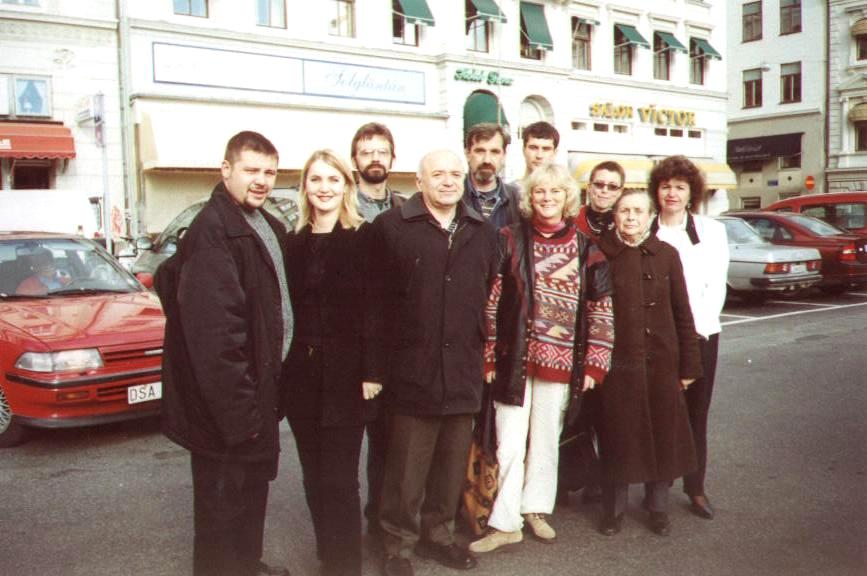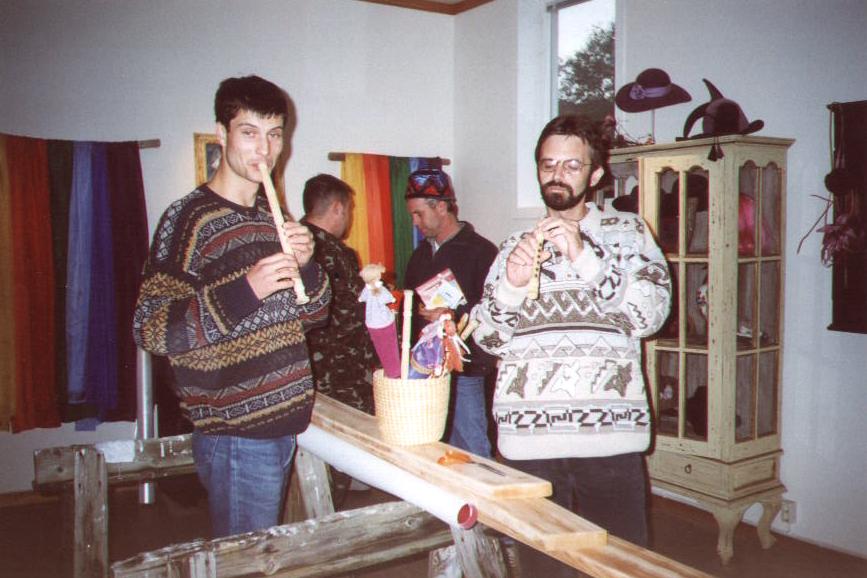The study visit of Ukrainian Green Party to Sweden - 11-18th of October 2000.
Participants:
Green Party of Ukraine:
Victor Khazan -- MP
Claudia Khalavenko - member of the party
Kyryl Tomlyak - youth branch
Kyryl Kosourov - youth branch
Serhii Moskvin -- MP
Olexandr Smyk - regional leader
Galina Katarynska - member of regional branch
Maryna Bondarenko - press-secretary

Miljopartiet/Green Forum and other Swedish participants (just to name some):
Eva Goes - Green Forum and Green Party
Birgitta Losman - Green Forum
Ann Margaret Mossberg -- Ljungskile
Eva-Lotta Holten -- Ljungskile
Marie Utter - Green Forum
Claes Roxbergh - Goterborg
Niklas Wennberg - Goterborg
Does a party's aim to enter or remain presented to the parliament(s) justify the
means of the party's activities and/or electoral behaviour?
What are the necessary conditions a green party should comply with to take the
responsibility of being within the executive power despite never having the overall
control within the branch?
What are the sources of a party actions' and position's independence that can guarantee
its survival and development?
Through continuous discussion and learning with local, regional and national representatives from both Ukrainian and Swedish side the mentioned core topics (as well as related
questions) were deeply studied and, in the opinion of many, successfully revealed.
A party is to be built upon the rock, which is strong, quantitative, initiative
and professional grassroots united together within appropriate democratic structure
and of course, by the common goal, which is to improve the environment.
This outline of the visit was drown out at the end of our stay in Ljungskile and
after our numerous activities and discussions in both Ljungskile and Goteborg.
In Goterborg we learned the city's waste management system and the activities of
the local greens that are connected also to the system since the greens in Goterborg
are part of the city council: they have 5 out of 76 seats there and are the members
of the city's Recycling Board. As a part of our practical studies we, accompanied
by Eva Goës, Birgitta Losman, Niklas Wennberg, and Marie Utter visited relevant
Renova incineration and soige processing plants, paper-recycling unit. The relevant
theoretical background was given to us during the meetings with Claes Roxberg,
the chairman of the Goterborg Recycling Board as well as by Marie Losman, Ecoplan
AB, who concentrated on the Swedish waste management practices in general and on
the connections between lifestyles, political decisions and measures taken by companies
as well as the connection of environmental problems waste and politician's means
to solve them.
Discussing the quality of the present Goterborg management system Niklas Wennberg,
political secretary of Goteborgs kommunstyrelse and the member of Goterborg green
party pointed out the following: "To the moment the good system of waste management
was created. However, there is a need to such regulations and approaches that will
lead to the limiting the creation of the waste itself. This is the ongoing challenge
of the greens".
If in Ljungskile the "green group" was concentrated on the acknowledgement with
local miljiopartiet grassroots and their life and further deep discussions of parties'
work approaches and future. We, as well, were given a chance to learn about folkhogskolas, their considerable input to the Swedish educational system. During the experience
exchange process with respect to new members invitation to the parties the material
of Per Lager, the Swedish MP, was particularly interested: he made a tour on a
number of Swedish territories by the bicycle, where in a funny way explained to
the public green ideas and approaches.
The film about the historical development of Miljiopartiet was not funny: people
were protesting against the anti environmental intentions of big businesses and
government that were going to build a new road through the wild nature. Prominently
united and gathered people protested and attempted to stop the construction. It
was understood: the activities of such people can influence the future of the country approaches to the environment.
The way of acting as well as proper ideology presentation has to persuade people
to think about the quality of environment and, consequently, the destiny of their
children. Then the part of such people forms the local units of the party. In the
result Milijpartiet, # has a very strong grassroots. We can loose the coming elections
but we will continue with the party and on the next elections will again have big
chances to succeed" - Eva Goes has said at the end of the visit.
Of course, the parting to the executive branch of power might result in the loss
of the votes. But the mature party can and should take part in it. And only the
strong, democratic, and developed party can be enough mature to bear successfully
the responsibility before the voters.

Kyryl Tomlyak